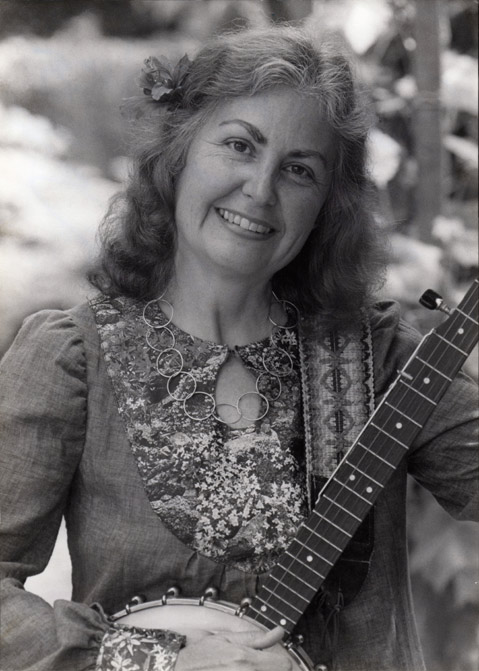Hilda Wenner, 81, a musician and author who taught hundreds of Santa Barbara residents to play guitar during the folk music boom, died February 5 from complications of Alzheimer’s disease.
Gregarious and armed with a high-wattage smile, she commanded classrooms filled with beginning and intermediate guitarists through Adult Ed starting in the 1970s, with an encouraging, yet exacting, teaching style. Many played their first songs in that setting, swept along by the singular thrill of a roomful of guitars propelling the music forward despite individual stumbles.

Hilda and husband Adrian moved to town in the summer of 1960 for a job he’d landed teaching biology at the fledgling UCSB campus, which then had dirt walking paths and few buildings.
The Midwest couple immersed themselves in ’60s Southern California culture, including attending “pot wars” on Mountain Drive with children Kurt and Gretchen while still eating meat-and-potato dinners for their first decade here. A weekly entrée of beef tongue — dreaded by children in their Prospect Avenue neighborhood — gave way to stir fry and organic veggies after a yearlong sabbatical in Hawai‘i started in summer 1970.
In California, our mother picked up the guitar, changing musical direction, as well. She had played piano since age 4, learning classical works and holding down tunes from Rodgers and Hart songbooks as her younger sister, also named Gretchen, sang.
When the folk music revival made the Carter Family and other old recordings popular again, Hilda became entranced by the sound of clawhammer banjo, Appalachian dulcimer, and Autoharp, which she also learned to play. Along with the familiar red box of Harry Smith’s Anthology of American Folk Music, her record shelf sagged with Pete Seeger, Joan Baez, The Limeliters, and other LPs. Hilda and Adrian frequented the Bluebird Café on Anapamu Street in the ’70s, making lifelong friends amid the live music.
Their home on Garcia Road became a gathering spot for jams, where fiddlers led off traditional tunes backed by banjo and guitar players crowded in the living room. They held house concerts in the large backyard, drawing touring musicians that included Peggy Seeger, Utah Phillips, and Jean Ritchie.
The Wenners were devotees of the Old Time Fiddlers’ Convention since the early ’70s, when Peter Feldmann founded it at UCSB. When the festival moved to Stow House, Hilda, Gary Jensen, and the late Linelle Glass, with assistance from Rotary Club of Santa Barbara Sunrise, took over running the event. For a time, Hilda owned it. Alzheimer’s ultimately slowed, and then halted, her participation.
Her ample energy led to many projects.
She completed a years-long effort to write a book on women’s folk music, teaming up with the late Elizabeth Freilicher on what became an anthology of 100 songs. Here’s to the Women was published by Syracuse University Press in 1987, with Pete Seeger providing the foreword.
A ragtime piano class she taught at Adult Ed in the mid-1970s evolved into the Santa Barbara Piano Club, which continues to meet. She returned to Hawai‘i many times over the years, pursuing a passion for slack-key guitar and ukulele.
Like her sister Gretchen — the two spoke almost daily on the phone — Hilda was deeply concerned with social causes. In the mid-1960s she was involved with launching a Head Start program through the Unitarian Church. On her own, she helped neighborhood kids learn to read. Her enthusiasm for the Great Peace March in 1986 led her to befriend many of the marchers.
Hilda’s artistic bent was carried forward by son Kurt, an internationally known artist who helped found Santa Barbara’s I Madonnari festival after earning top honors for his three-dimensional chalk art. He has continued with a prolifically successful career headlining events around the world.
Her musical passion was shared by daughter Gretchen, who, before becoming a newspaper reporter, learned guitar at 8. She played locally with Nancy Drew and the Clues before heading to Seattle in the late 1980s, playing in bands and recording during the burgeoning grunge scene there.
Born and raised in Michigan to parents Orville and Margaretta Engle, Hilda met Adrian at the University of Michigan, where she was a proud resident of the Martha Cook dorm. Adrian, a Minnesota native, was in grad school and, lacking substantial funds, courted her with guppies from the lab. They married in 1957. Adrian became known for his work with bees and sand crabs before retiring from UCSB. He proved a devoted and tender caretaker through Hilda’s decline.
Although Alzheimer’s robbed her of speech in her final years, Hilda stayed keenly present and cheerful into her last hours, interacting through facial expressions and an observant gaze.
She enjoyed music to the end. When her daughter played Hilda’s favorite songs on guitar and banjo, Hilda sang when she could no longer converse. When singing faded, she would perk up to familiar chord progressions and whistle along with the tunes she loved so well.
The family extends its gratitude to the caring staff of Casa St. James and the local agencies that helped them navigate this journey.
She is survived by Adrian, Kurt, Elizabeth, and Anders; the two Gretchens (plus Harry, Kai, and Soren); Chin and Nathan; and many loving family members and friends.
Hilda’s generous spirit will be missed. The family hopes in her honor you might play a song for a friend or otherwise share your gifts with those around you.
